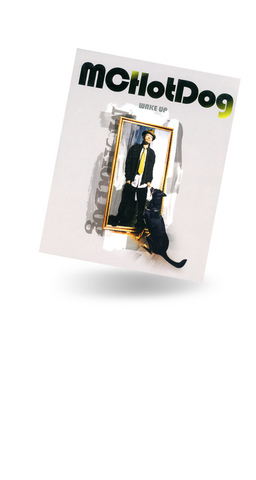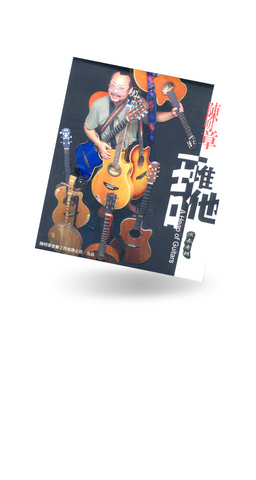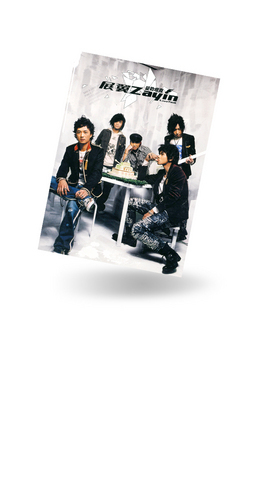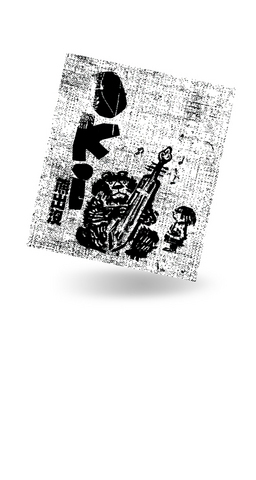MC Hot Dog
Wake Up
Rock

He might be fast becoming the old man of local hip-hop, but MC Hot Dog remains undeniably at the top his game. His latest album, Wake Up attests to this in spades and along with his bad-mouthing buddy, Chang Chen-yue (
Sure, it's not wholly mainstream and at times could be considered offensive, especially when the hard working hip-hop star goes out of his way to ridicule a popular local model as well as several other celebrities of note. But then, hey, who really cares? This is the world of MC Hot Dog. Enter if you dare.
The album is at times soulful and at other times comical and altogether works well enough to put him in the running for top honors at this year's Golden Melody Awards.

Some of the finest moments include the rather self-serving, yet undeniably brilliant I Love TW Girls (
The most comical moment, however, is the sidesplitting parody I Grew Up at TU (
Chen Ming-chang (

A Heap of Guitars (
CMC
I conic crooner Chen Ming-chang (陳明章) returns to record store shelves this month with an aptly titled album on which the one-time rebel rocker-turned-mainstream-folk idol showcases his prowess on a range of guitars.

Featuring a myriad of sounds and styles, the album will appeal to both those with prior knowledge of Chen and his music, as well as those for who know Chen as the guy who penned the Kirin Beer commercials.
Not all of the material featured on A Heap of Guitars (一堆吉他) is new but this shouldn't deter listeners from enjoying the moody and pleasing selection of tunes. The album kicks in predictably enough with -- yes, you've guessed it -- the theme tune for Kirin Beer.
There are four versions featured on the album and while the original TV version is great, the "flute," "waterfall" and "tea leaf picking" variations are entertaining. The best version is the "tea leaf picking" number, however, which features Wu Bai's band China Blue. It's a mere 50 seconds long, but even in that short space of time Chen's masterful songwriting prowess manages to impress.
After the excitement of the Kirin theme tune, listeners are graced with a myriad of moody folk tunes and traditional Taiwanese min ge (民歌) material on which Chen manages, even when playing the ear splitting yeuqin (月琴), to sound at peace with the musical vibes he is creating.
Zayin
Love Tank (
Avex
Released three weeks ago, Love Tank (愛的坦克) is the second studio album by the power-pop five-piece Zayin and, like the combo's 2004 self-titled debut, showcases the band's ability to blend fiery alt-rock riffs with more mainstream Mando-pop hooks.
Formed by five Taiwanese guys who met while living in New Zealand, Zayin started life as a "garage band" and shared stages with many of the nation's far less talented rock acts at spit-and-sawdust dives and outdoor festivals.
Zayin are a step above much of the opposition and the material on the boys' latest album is expertly executed and works well.
The music is tight and well produced and the tunes all feature the trappings of US alt-power-pop combo American Hi-Fi, as well more ballad-like oriented moments in the vein of Third Eye Blind.
Saying that, Love Tank actually gets off to a pretty unoriginal start. Instead of grabbing the listener with a nice slice of originality, Zayin has resorted to ripping off the opening bars of a well known Green Day number. (We should be grateful it was not the Kirin theme tune).
Thankfully this is the only blooper on what is for the most part a fine piece of vinyl. Highlights include the jerky, prog-rock-like First Light (曙光), the gritty pop- oriented Street Dog (流浪狗) and Paradise Party (天堂派 ), which features kitsch lyrics with a kick-ass, early-1980s Inxs-like sound.
Oki
Here Comes the Bear
TCM
A long with being a beacon for local non-genre specific local acts, Taiwan Colors Music has also released several albums by a handful of talented, yet far from mainstream Japanese musicians over the years. The latest in this interesting and insightful collection is Here Comes the Bear, by master of contemporary tonkori music, Oki.
Oki may be new to Taiwan audiences, but with half a dozen albums and appearances at several world music festivals, including Womad, under his belt, the Hokkaido-based musician is a force to be reckoned with and one of the few to dare to dabble with a form of music that was until as recently as 1990 close to disappearing.
Resembling the neck of a guitar, the tonkori was developed by Japan's Ainu tribe. The long, flat and fretless instrument can produce a myriad of haunting tones due to the narrow area in which the sounds are forced to reverberate.
While styles of Ainu music have traditionally revolved around the yukar, which is a form of epic poetry and the upopo, which is a vocalized form of contrapuntal, or polyphonic music based around chanting, Oki has taken Ainu musical forms to new and exciting levels.
His revamped and hybrid tonkori-driven music combines a whole heap of traditional sounds with elements of world music as well jazz, blues and reggae. The contrasting combinations may sound like a musical accident waiting to happen, but Oki's tunes are all faultless and worthy of high praise.
The album meanders in with a lounge-meets-dub combination on the tune Yaikatekara Dub, on which Oki's tonkori plays second fiddle to a fusion of Valium-laced laid back jazz. The material might take some getting used to, but it is incredibly soothing and after few minutes and you will be hooked.

June 9 to June 15 A photo of two men riding trendy high-wheel Penny-Farthing bicycles past a Qing Dynasty gate aptly captures the essence of Taipei in 1897 — a newly colonized city on the cusp of great change. The Japanese began making significant modifications to the cityscape in 1899, tearing down Qing-era structures, widening boulevards and installing Western-style infrastructure and buildings. The photographer, Minosuke Imamura, only spent a year in Taiwan as a cartographer for the governor-general’s office, but he left behind a treasure trove of 130 images showing life at the onset of Japanese rule, spanning July 1897 to

One of the most important gripes that Taiwanese have about the Democratic Progressive Party (DPP) is that it has failed to deliver concretely on higher wages, housing prices and other bread-and-butter issues. The parallel complaint is that the DPP cares only about glamor issues, such as removing markers of Chinese Nationalist Party (KMT) colonialism by renaming them, or what the KMT codes as “de-Sinification.” Once again, as a critical election looms, the DPP is presenting evidence for that charge. The KMT was quick to jump on the recent proposal of the Ministry of the Interior (MOI) to rename roads that symbolize

On the evening of June 1, Control Yuan Secretary-General Lee Chun-yi (李俊俋) apologized and resigned in disgrace. His crime was instructing his driver to use a Control Yuan vehicle to transport his dog to a pet grooming salon. The Control Yuan is the government branch that investigates, audits and impeaches government officials for, among other things, misuse of government funds, so his misuse of a government vehicle was highly inappropriate. If this story were told to anyone living in the golden era of swaggering gangsters, flashy nouveau riche businessmen, and corrupt “black gold” politics of the 1980s and 1990s, they would have laughed.

In an interview posted online by United Daily News (UDN) on May 26, current Chinese Nationalist Party (KMT) Chairman Eric Chu (朱立倫) was asked about Taichung Mayor Lu Shiow-yen (盧秀燕) replacing him as party chair. Though not yet officially running, by the customs of Taiwan politics, Lu has been signalling she is both running for party chair and to be the party’s 2028 presidential candidate. She told an international media outlet that she was considering a run. She also gave a speech in Keelung on national priorities and foreign affairs. For details, see the May 23 edition of this column,